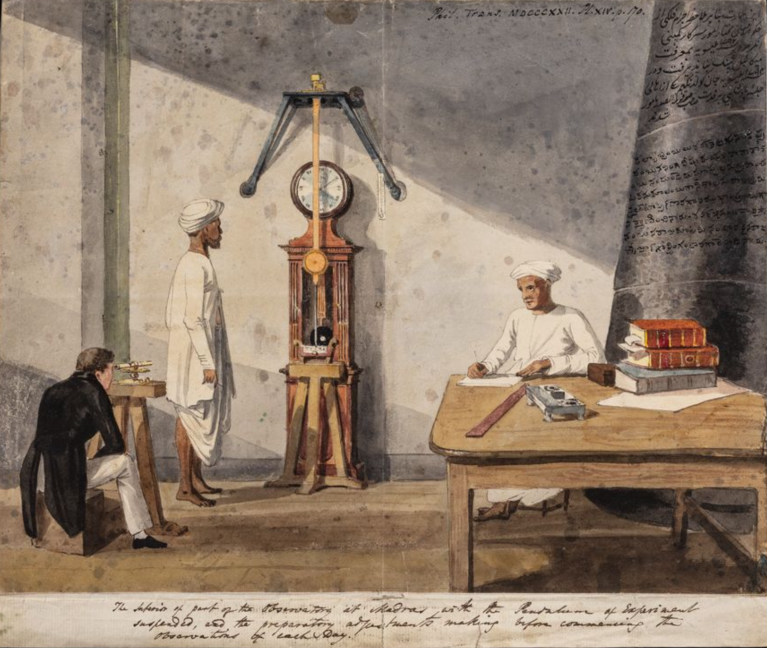A painting by an unknown artist showing the interior of the Madras Observatory. Credit: John Goldingham/The Royal Society Archives, London
India’s efforts to build diverse science archives are hindered by a lack of trained professionals, long-term positions, and relevant academic programmes, science historians and archivists say.They fear that in the absence of standardized preservation protocols, consistent funding, and improved access, India could lose the records of a substantial proportion of its scientific history.
Jahnavi Phalkey, the founding director of the Science Gallery, in Bengaluru, says India is yet to reach a critical mass of accessible, diverse archives and a robust community of historians, sociologists, and philosophers of science. This gap limits contributions to contemporary scientific discourse and research.
A shortage of archivists and conservation specialists is thwarting efforts to preserve institutional archives, personal papers of scientists and technicians, annual reports, funding agency records, parliamentary archives, and media archives. Data archives also need experts with an understanding of biases and assumptions to create and manage datasets.
Louisiane Ferlier, Digital Resources Manager at the Royal Society’s Centre for the History of Science in London, emphasizes the importance data archives in the collective nature of scientific research, thought and practice. The society plans to digitize and make accessible 18th and 19th-century weather records from India, using AI transcription and crowdsourcing. “We have the material, including the full run of observations from the famous Madras Observatory,” she says.
Few institutions, such as the National Archives of India, offer training for archivists. Long-term positions are scarce, and there are limited degree programmes in the history, philosophy, or sociology of science, notes Phalkey.
Venkat Srinivasan, an archivist at the National Centre for Biological Sciences (NCBS) in Bengaluru, stresses the importance of data-sharing frameworks to interpret historical scientific developments. Consistent funding is crucial for any science archive to survive.
There’s also need for cooperation among science archives and for understanding interconnected research histories, says Indira Chowdhury, who established several archives including at the Tata Institute of Fundamental Research in Mumbai. She highlights the need to understand the social history of science. “When people move across institutions, what research traditions do they carry with them?” she asks.
Science archiving does not deal only with the past, Phalkey says. Active scientists should support archival work, especially as many documents and objects are now digital-first, she points out. The lack of physical and digital preservation standards in India poses a significant challenge.
“We can align with global standards and tailor them for local use to ensure long-term curation,” notes Srinivasan. Additionally, accessibility of archives remains an issue due to bureaucratic hurdles, says Chowdhury.
For Chelsea McGill, CEO of Immersive Trails, better access to archives at the Indian Association for Cultivation of Sciences would have enhanced her work on a walk capturing scientific and medical experimentation in Victorian-era Kolkata. Public outreach around science heritage needs careful planning, not ad hoc events, she says.
“I relied on archive.org and books for the original materials,” says McGill. Currently, she is cataloguing and researching the extensive collection of Jagadish Chandra Bose and Lady Abala Bose. “No one has catalogued it before, so we are not sure what’s there,” she adds.
“The pace of research and community growth is not sufficient to capture rapidly disappearing histories,” Phalkey says.
